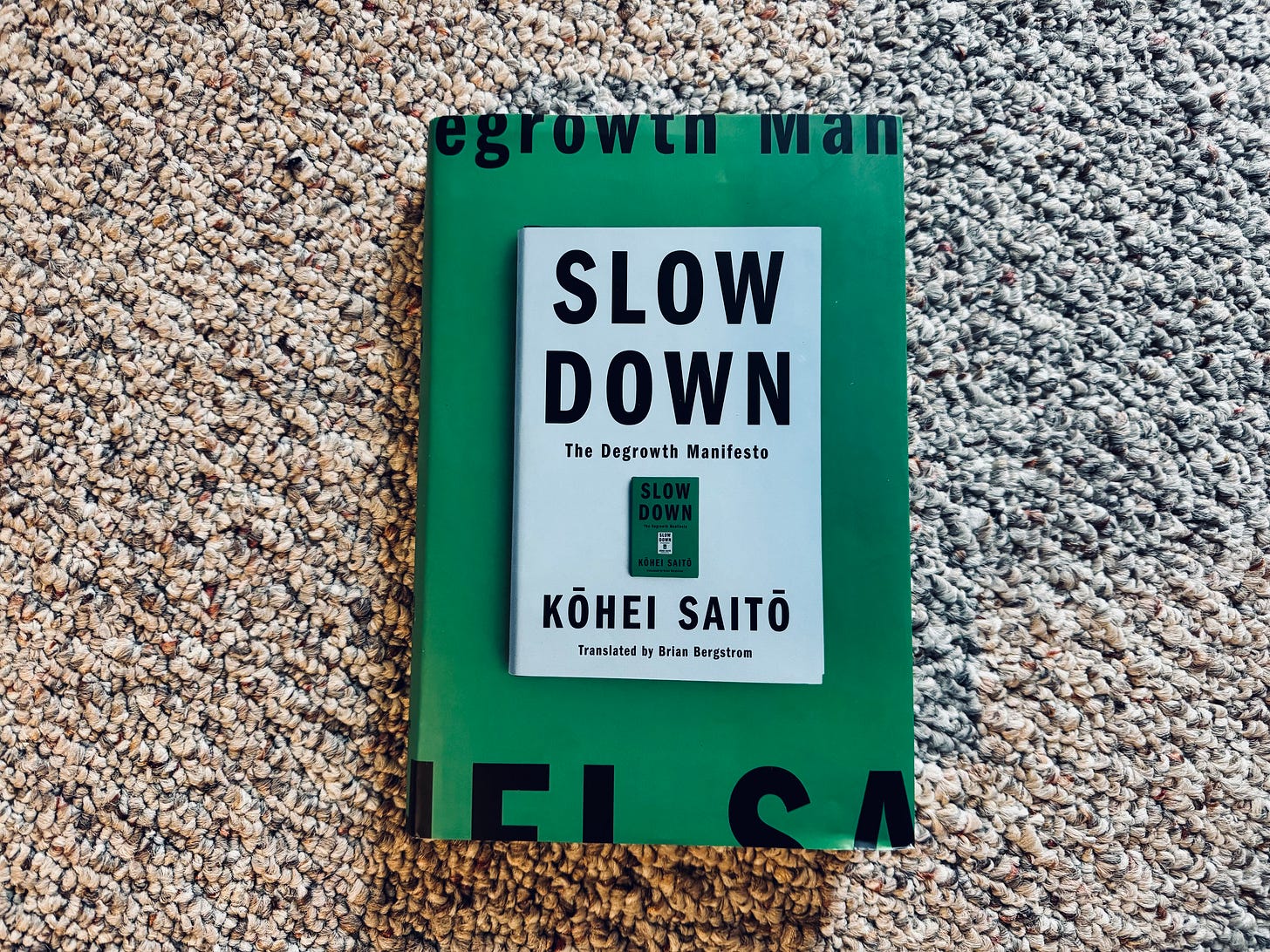*Earlier this year, I spoke with Kohei Saito about his new book for the Intelligence Squared Podcast. You can listen here.
Someday, perhaps not long from now, the inhabitants of a hotter, more dangerous and biologically diminished planet than the one on which I lived may wonder what you and I were thinking, or whether we thought at all…
William Vollmann, Carbon Ideologies

The quote above is the first line of William Vollman’s Carbon Ideologies, Volume I. I’ve only read a few pages of the tome, and barely ruffled the cover of Volume II, but I reached for both of these books – and Slouching Towards Utopia: An Economic History of the Twentieth Century – as ballasts for navigating my swirling malaise after finishing Kohei Saito’s Slow Down: The Degrowth Manifesto.
Saito’s prose is authoritative and direct, if sometimes clipped and can feel like someone saying all the quiet parts out loud, or reading fine print into a megaphone. Slow Down is also ambitious: serving both as a reclamation project – applying overlooked elements of Karl Marx’s late scholarship to our modern crisis of climate change – while offering a manifesto (of a kind) for what we, as citizens of our busted planet, should do to avoid our impending disaster. To be clear, the cause of our plight is unmistakable: we rode capitalism across the unknown frontier and scorched all fertile ground behind us. As Saito notes, in almost precisely these terms: there is no going back.
Slow Down warns us that trying to fix what we’ve done from within the prison of capitalist constraints is laughable, but not in the comedic sense — unless sacrificing the future of our children, and their children, and everyone else’s children is your form of gallows humor. Instead, we need to shed the ideological shackles of capitalism and re-imagine an economic arrangement that preserves the public commons, instead of one that divides those shared resources to produce private riches. Focusing on enough instead of more, in other words, will help recenter what Saito calls the metabolism between humans and nature, and should be reinforced by a commitment to mutual aid and trust. Saito argues that these changes are necessary if we stand a chance at “overcoming capitalism, reforming democracy, and decarbonizing society.”
There were moments where I scoffed at Saito’s commitment to burnishing Marx’s underappreciated evolution of mind. Not because this commitment is fruitless, mind you, just that re-litigating philosophical arguments of years past amidst our existential environmental crisis felt – in my more pessimistic moments – like rearranging furniture on the deck of the Titanic. Though, to be fair, one couldn’t be sure there’d be an iceberg to hit today.
However, returning as I did to the marked and highlighted pages, wading back through the scratched marginalia, I found Saito’s refrains tugging uncomfortably on many other threads commonly tangled in my mind. It made me wonder: could I be a communist?
Who cares, really.
Labels and logos, brands and their persistent ideologies, are mere dogma obscuring meaningful engagement with our current and coming crisis. Saito’s work — and lingering questions of political or philosophical allegiance, if they mean anything — bears consideration because the questions that we, collectively, seem to be struggling with find their origin story in the structural madness of our neoliberal model of capitalism. A madness that has breathed life into a range of self-help and personal development approaches that suffuse our modern lives.
I’m thinking here of Stoicism — much renewed of late — which translates strategies from an ancient school of thought to aid individuals in improving their purposeful discipline. These lessons are meant to strengthen our ability to address challenges and control our reactions in daily life. This is good and useful advice, of course, but merely improves our ability to handle the mounting disappointments of our status quo. Stoicism is a philosophy of maintenance, not revolution.
Keeping on keeping on, as it were, offers stability despite this tiring rhythm, and obscures capital’s invisible hand in our fixation with productivity. Productivity, as a concept, used to apply to manufacturing before the entrepreneurial spirit of recent generations tailored it into a kind of lifestyle. Evidently, we can derive certain joys from making ourselves more productive — do more in less time for more money – by deriving solace from our agency in the struggle. Distilled to its most blunt and direct, being productive and thus producing something that only you could produce makes you attractive to the market. We were in business. We were the business!
One of productivity’s sages, Cal Newport, wrote his book, So Good They Can’t Ignore You, arguing just this: if you want to succeed you have to cultivate something that was rare and valuable. The Marxist theorist, Franco Berardi, criticized just this notion in his book, After the Future: “we are all capitalists … [and] the essential idea is that we should all consider life as an economic venture, as a race where there are winners and losers.” In other words, we’ve adopted the market’s rules, even when we didn’t derive suitably just desserts. Either directly or indirectly, this framing illustrates just how deeply embedded our commitment to optimization has become.
Perhaps unsurprisingly, our personal angst and anxiety is likely connected to this ceaseless drive towards perfection. As Coco Krumme writes, in Optimal Illusions, we now recognize that optimization has “eaten up our time and our attention and even our future, its filled our bellies and our schedules, and it’s left a vacuum when it comes to knowing why.” Like tomorrow, perfection always approaches but never arrives.
For some, like Oliver Burkeman, it was finitude — life’s last call — that prompted a sharp critique of our to-do-list society.1 In his words, even those who won the small battles with efficiency, lost the wider war: “you’ll get more done, race to more meetings, ferry your kids to more after-school activities, generate more profit for your employer… [but] you only feel busier, more anxious, and somehow emptier as a result.” Over time, what else could we do but burn ourselves out?
This malaise or discomfort among the professionally productive was evident to one of productivity’s most prominent voices. Cal Newport, speaking with Tim Ferriss back in 2022, discussed how his book, Digital Minimalism, was released alongside many others “pushing back an empty, crushing busyness.” That conversation, and its reference to emerging works that troubled propositions behind a productive life, led me back to How To Do Nothing, Jenny Odell’s quiet manifesto about finding the time, space, and imaginative territory that hasn’t been overrun by the attention economy. As she writes, in a passage evocative for its clarity: “I believe that capitalism, colonialist thinking, loneliness, and an abusive stance toward the environment all coproduce one another.” This kind of braided embrace is difficult to untangle.
Cal Newport, reflecting on life after the pandemic’s destruction, has now recast his approach as the search for the “deep life” and released, this week, his newest book, Slow Productivity: The Lost Art of Accomplishment Without Burnout. Perhaps this course correction was inevitable: the replacement of purpose with profit was bound to have dwindling returns. This is the conceit of David Brooks’ book The Second Mountain: The Quest for a Moral Life, which argues that striving and even achieving status (read: wealth and merit) still leaves the victors with the unsettled debt of discerning what life was really about.
Arthur Brooks and Oprah’s latest offering, Build the Life You Want, cuts closer to the bone by exploring how and why all our modern attempts at finding happiness (or ‘happierness,’ as they may prefer) tend to fail. We are poorly oriented animals, it seems — maybe pushed and pulled by some invisible hand, if you can stomach another market metaphor. Reading darkly into this contemporary trap, I think Saito would argue the ideology of capitalism was to blame. So many of these lifestyle solutions feel like aesthetic renovations made inside your prison cell. They might raise morale but they won’t open the barred doors.
I mention these books and authors with humility, of course. I know this work because I turned to it in my own meandering search for purpose. But they each suffer the same affliction: they are palliative while placing the responsibility on the individual – narrated in the language of discipline — to be the change they want to see in the world. Of course, these stronger willed humans must still face down the same economic buzzsaw — without the bandwidth for the kind of mutual aid or support that a friendlier system might encourage. Perhaps we are at the beginning of change, though. A rising (and younger) chorus of voices may see the narrow corridor of escape from the grindstone of our inequality-producing system.
I’m not certain, but we should care.
I want it to be easier to imagine the end of capitalism than to imagine the end of the planet. I’m not saying that degrowth communism — Saito’s proposition — has to be the solution. Unlike Saito, I don’t know enough about what the fix might look like. But if his vision allows us to swerve away from the precipice, I’m certainly not against it. What I want isn’t some certainty about a world made liveable if and only through our ingenious weaponization of technology, for example. I’d just prefer a sign that whatever world endures isn’t some wasteland populated by the tired and ragged, commonly driven by the need to survive. I want a future where my children’s children’s children have the chance to ask whether Saito’s arguments about Marx’s deathbed reimagining of communism were correct.
In short, Saito challenges us to think about a world that labours towards a balance between our needs and what we produce – distinct from a system that services our wants at the cost of our planet. After all, foregoing those excesses may preserve the only luxury nature ever granted us: a chance at life.
Burkeman’s book, 4000 Weeks: Time Management for Mortals is one of my favourites. Highly recommended.




